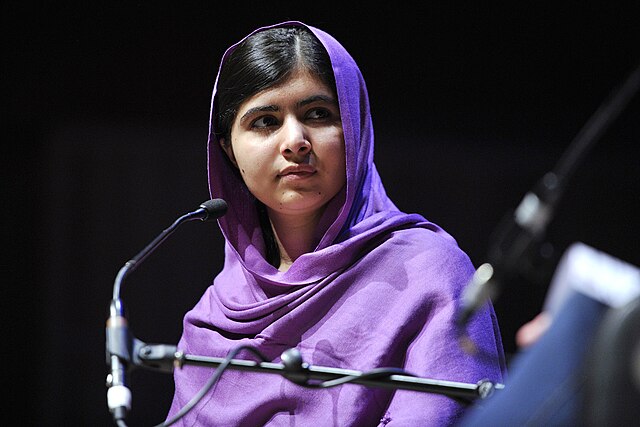Malala Yousafzai discusses new book, mental health at Shubert talk
The event, which was a part of Yousafzai’s “Finding My Way” book tour, took place Sunday evening and drew over a thousand attendees.

Southbank Centre via Wikimedia Commons
Malala Yousafzai spoke to more than a thousand people at the Shubert Theater Sunday evening about her new book, “Finding My Way,” which came out on Oct. 21.
Yousafzai, a 28-year-old Pakistani activist who won a Nobel Peace Prize for her children’s rights activism, discussed her new book with actor Arian Moayed, who portrays Stewy Hosseini in HBO’s Succession.
Moayed described “Finding My Way” as “a very honest book.” His discussion with Yousafzai centered on navigating friendships and relationships, taking care of mental health, and the Malala Fund’s work. The audience was a mix of Yale students and locals of all ages.
“In my new book, I share about my journey as a college student and how I was a very passionate student about bringing change in the world,” Yousafzai said in an interview. She added that, at the same time, she knew how important it was for her “to learn and grow as a person” and to “make friends.”
“It’s important that we balance the two,” Yousafzai said. “It’s important for us to ensure that we are making friends and finding the things that we love and enjoy and ask for help, whether that is academic support or mental health support, and at the same time, never give up on the causes that we want to work for.”
Amelia Warren ’27, who was in attendance, has known Yousafzai for over a decade.
“I went to her Nobel Peace Prize ceremony when I was super young,” said Warren, who explained that she has come to know Yousafzai through her mother’s position on the Malala Fund board.
Warren said she last saw Yousafzai speak in public at the 2014 Nobel Prize ceremony, but she has come to know Yousafzai more personally over the years.
“It was really great to see how she was the person I know just hanging out on stage,” Warren said about watching Yousafzai open up on her book tour. “She’s just the sweetest person.”
During the event, Moayed and Yousafzai discussed her husband, Asser Malik, and how her view on marriage has changed over the years.
When she met Malik, Yousafzai said she liked him but was uncertain about marriage.
“I was just so confused about marriage. Growing up, I had seen how so many girls lost their future because they were forced into marriages,” Yousafzai said.
In these moments, Yousafzai said she turned to the writings of prominent feminist thinkers like bell hooks and Virginia Woolf.
Eventually, it was spending a lot of time with Malik that helped her find the answers.
“The time with him was so beautiful and I knew he was the right person,” she said.
Moayed and Yousafzai discussed the vulnerability of “Finding My Way.” Moayed read an excerpt of the book where Yousafzai wrote, “I didn’t believe that anyone would want me. I felt too ugly to love.”
The book is “so vulnerable,” Moayed said. “But knowing you, it’s just so honest and true.”
Yousafzai told the audience about her difficulty making friends in high school, and how building close friendships was a priority for her while in college. She talked about how her time at Oxford allowed her to explore new things, such as by signing up for clubs and sports, and create meaningful friendships.
Still, balancing academics, a social life and a career as an activist was a challenge, Yousafzai said, and struggles in college pushed her to find both academic and mental health support.
Yousafzai discussed her experience starting therapy during college. She spoke about how she realized she could not solely help herself anymore.
“I didn’t really believe in therapy,” she said, explaining the stigma attached to seeking mental health treatment growing up in Pakistan. She was diagnosed with PTSD and anxiety, and has been in therapy since college, she said.
“The therapy sessions have helped me,” she told the crowd. “I would not be in this place if I had not received the therapy.”
Christine Zwart, who attended the event with her family, appreciated hearing Yousafzai “speak so candidly about mental health.”
Zwart explained that the third grade curriculum at her kids’ school in Guilford teaches about education around the world, including about Yousafzai.
During the event, audience members had the chance to ask Yousafzai for advice. An eighth grader asked a question about how to maintain self confidence in school, and a grandmother asked how to support her bicultural granddaughter with navigating a changing world.
Yousafzai spoke about feeling pressure to live up to what was expected of her, of being told she was “brave and courageous” for standing up to the Taliban. She said she internalized that by believing she could never cry or be afraid.
“True bravery is when you do what you believe in, even when you are scared, even when you are frightened,” Yousafzai said.
Yousafzai won the Nobel Peace Prize in 2014 when she was 17 years old.







